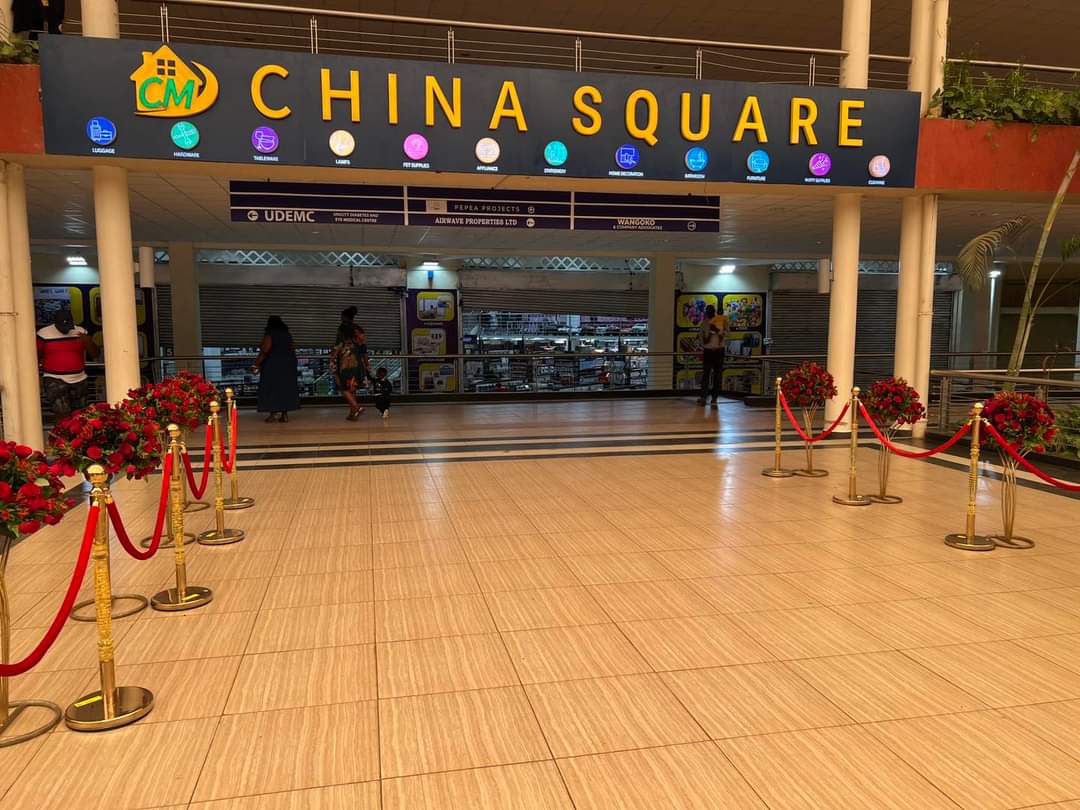BY SAM ALFAN.
Small scale traders in Nairobi have moved to court to block Chinese-owned mall China Square from importing and selling merchandise from China.
The traders who operate at Gikomba, Kamukunji among other areas want the Chinese nationals blocked from engaging in retail, wholesale and distribution of merchandise, machinery for agricultural, domestic, office and light industrial or manufacturing use.
They also want the High Court to temporarily restrain the Director Kenya Citizens and Foreign Nationals Management Services from issuing Class D and G permits to Chinese nationals, pending the determination of the petition.
The traders who moved to court include Peter Kariuki, David Kamau, Clinton Kabage, Nimrod Kihiu, Christine Ndung’u, Jane Muturi, Edward Kamau and Martin Magondu.
The traders sued on their behalf and on behalf of hundreds of traders under the Indigenous Capital Protection Association.
“We are apprehensive that unless this Honourable Court intervenes, Kenya could become China’s 35th Province faster than Africa could turn into China’s second continent,” pleads the traders.
Through lawyer Kibe Mungai the traders want the court to compel Kenya Investment Authority to provide a list of all foreign investors from China who were issued with investment certificates between 3rd October, 2005 and the basis of such issuance under Section 4 of the Investment Promotion Act, 2004.
The further want the government to confirm the immigration status of the operators of tens of Chinese owned businesses including China Square Mall, Lei Cheng, Bromance Trading Co.ltd, Heber Trading Company ltd , Afrilighting Company ltd, Tiny International Trading Company, Solarmax Trading Company,Frotis ltd, Silvermon Company ltd and Silvermon Company ltd.
Others are TBS ltd, Ottima Building ltd, JTC Technology Kenya ltd, Housmart Co.ltd, BTT Trading company, Yuxuan Trading, Tokyo Trading Global (TT), Reergood computers and HTC Cables.
The list also includes Twiga Solar, Zhu Jia Hao,Hi Joe, Zhou Wei Wei, Lu Xingchao, Cheng Xian Zhong , Chen Lijun.
The traders wants the court to compel CAK to conduct an investigation and file a report in Court on whether the China Square Mall – is engaging in predatory pricing to drive competitors out of business or to deter market entry for the benefit of manufacturers, distributors, wholesalers and retailers from the People’s Republic of China.
“A conservatory order of injunction be issued to restrain the 14th Respondent – Kenya China Chambers of Commerce – from lobbying to facilitate, aid and abet the immigration of petty entrepreneurs, hawkers and Hustlers from China and establishment of Chinese business in the retail, wholesale and distribution sectors of the Kenyan economy pending inter-partes hearing of this Petition,” seeks the traders.
Lawyer Mungai argues that the application is extremely urgent because various organs and officials of the Kenyan State have been promoting, aiding and abetting the influx of Chinese nationals into Kenya.
He said the establishment of Chinese businesses threatens the survival of the businesses and the livelihoods of over 2 million Kenyans and over 5 million dependants.
“In view of the increasing numbers of Chinese hawkers shopkeepers, Route Eleven (11) traders, small scale retailers, wholesalers and distributors in Nairobi’s Business District East of Tom Mboya Street comprising of River Road, Kirinyaga Road, Kamukunji and Gikomba areas among others, the applicant are convinced that the process of issuing permits to Chinese citizens has been so corrupted or otherwise compromised by the Kenya Chinese Chambers of Commerce and other Chinese nationals operating businesses in Kenya,” the traders say in court papers.
They argue that the proliferation of hawking and micro-retail activities by Chinese nationals moving around on foot, setting up stalls, shops or trading from the boots of mini-vans is a testament that the Kenya Investment Authority and the Kenya Citizens and Foreign Nationals Management Service are complicit in a grand scheme by the government of China to foist upon Kenya Chinese Hustlers and economic migrants under the guise of investment and legitimate economic activities in Kenya
Consequently, the issuance of investment certificates to Chinese nationals should be stopped forthwith in order to stem the influx of foreigners whose involvement in the Kenyan economy is prejudicial to the Petitioners and Kenya’s long term economic interests and benefit.
“Given that the China Square Mall is for all practical intents and purposes an agency of the Chinese government and manufacturers seeking to maintain economic production in China and to escape the necessity of establishing factories abroad by opening distribution outlets for China’s industry, it can only be in Kenya’s national interest to stop selling and importation of merchandise from Chinese manufacturers and distributors forthwith which is adversely affecting the Petitioners and other traders in Kenya,” they further told the court.
The traders argue that in order to prevent further entrenchment of establishment of Chinese Businesses in economic fields that should be reserved for citizens of Kenya, the County Government of Nairobi City should be restrained from issuing single business permits and other licenses to Chinese nationals.
The reservation of specified economic fields as exclusive to citizens of Kenya is the only practical way to ensure that Kenya citizenship accrues some benefits and privileges to traders who are Kenyan citizens and to ensure that practical steps are made to realize the social and economic rights enshrined by Article 43 of the Constitution.
“Under Article 35 of the Constitution, the Applicants are entitled to be furnished with a list of Chinese citizens who have been issued with permits under Section 40 of the Kenya Citizenship and Immigration Act. Such a list would inter-alia, confirm that so many Chinese citizens are living in Kenya illegally and engaging in business activities harmful to Kenya’s long term economic interests,” adds the traders.
According to the traders, given the economic activities that Chinese citizens are engaging themselves in, all reasonable indications are that they have not been issued with investment certificates. Consequently, the Kenya Investment Authority should provide the Petitioners with a list of all investment certificates issued to Chinese citizens and the basis upon which they were issued.
“There is need for the Competition Authority of Kenya to conduct an investigation and file a report in court on whether China Square Mall is engaging in predatory pricing to drive competitors out in order to establish a long-term monopoly in the Kenyan market for Chinese manufacturers and distributors,” traders told the court.
Through lawyer Kibe, they argue that given that the People’s Republic of China (PRC) is the world’s second largest economy, there can be no justification why it is encouraging and facilitating the take-over by its nationals of every economic activity from the Petitioners and other indigenous traders, entrepreneurs and owners of capital and displacement from gainful economic activity.
To be sure, the China-Kenya international trade which in 2022 was valued at USD 3.71 Billion (491.14 Billion Shillings) of goods imported by Kenya from China and USD 2.33 (31.22 Billion Shillings) of Kenyan exports to China should result into some tangible benefits for indigenous Kenyan traders including the Petitioners.
Despite the fact that Articles 12, 18 and 21 of the Constitution enjoin the Kenya State and other State organs to ensure Kenyan citizenship confers rights, privileges and benefits through promotion, fulfillment and protection of their economic and social rights among other fundamental rights and freedoms, the relevant organs of the Government responsible for immigration and licensing of foreign investors have refused, neglected or otherwise failed to ensure that the policy of the PRC to export or dump its excess population overseas does not result into hardship to Kenyan Citizens as the Petitioners are currently experiencing.
They argue that that whilst Section 4 of the Investment Promotion Act, 2004 envisages, inter-alia, that a foreign investor must invest at least one hundred thousand United States Dollars (USD 100,000) or the equivalent in any currency and that “the investment and the activity related to the investment are lawful and beneficial to Kenya”, the Respondents have aided and abetted the take-over of the import and retail trade by the Chinese in a manner that is detrimental to Kenyan economic interest and the business interests of its citizens including the traders.
“This Court should note that across the African continent the influx of Chinese migrants ranging from elite owners of factories and technology corporations to wholesale distributors and onwards to semi-educated and unskilled workers, hustlers, hawkers and other petty entrepreneurs have frequently led to social, political and economic tensions due to the disruptive and displacement effect of Chinese migration,” adds the traders.
According to the traders court, currently, about two million Chinese live in Africa the majority of whom are blue collar workers, hustlers, peasants, proletariat and other low-life Chinese citizens who have come to take over economic opportunities from the local people. About ten years ago Howard French wrote a book titled China’s Second Continent in which he described how a million Chinese migrants are building an economic empire in Africa.
They further argue that the fact that at the core of their grievances is the grim reality that the Kenyan State is increasingly unable to uphold and defend the sovereignty of its people and therefore finds nothing wrong in siding with foreign interests particularly those advanced by the PRC whenever there is a conflict.
To be sure, the defining feature of the colonial economy was the racial divide of ownership rights in which White and Asian Communities could own the choicest properties and access to resources whilst Africans could only be workers and serfs living in conditions of poverty and the spectre of re-establishment of neo-colonialism embodied in the worsening stakes of Kenyans in the economy is both chilling and revolting to the traders.







